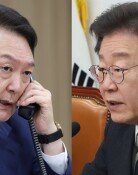Experts Say Korea-U.S. Relations Should Broaden
Experts Say Korea-U.S. Relations Should Broaden
Posted December. 31, 2007 05:29,
Many Koreans say that the Korea-U.S. relations should revert to how they were during better days with the new administration, but it is not enough. It shouldnt just return to the golden age. Instead, the two countries should discuss global issues in addition to strengthening cooperation regarding the North Korean nuclear issue, said David Straub, former Director of the Office of Korean Affairs, U.S. State Department.
Washington officials are asking Lee Myung-bak, the president elect, to reposition Korea as a global player.
They expect the deterioration to the alliance that occurred during the Roh Moo-hyun administration to be reversed. They are also saying that the alliance needs go global, beyond matters tied to North Korea and the Korean Peninsula.
An alliance that goes beyond North Korea and security-
A Washington official said on December 28, The U.S. administration have delivered its intention to expand the alliance into a global one for several years, but Korea hasnt shown much response. However, now expectations are rising that Korea will play a larger role as a partner that shares our values of democracy and market economy.
U.S. Ambassador to Korea Alexander Vershbow stressed, The alliance needs to be globalized. We have various issues to cooperate on, such as peacekeeping in Afghanistan and Iraq, Palestine and the Middle East issues, climate change, and disease eradication.
An expert at a Washington think-tank said, Korea has always said that it wants an equal relationship, and the U.S. welcomes the idea. However, many are skeptical of whether Korea is doing its part in the international arena consummate to its national strength. They point out that Korea only cares about household issues in North Korea and on the Korean peninsula, but is ignorant of issues in their neighborhood.
The expert added, Although Korea in the 1990s was well-responsive to Bill Clintons Community of Democracy, that attitude turned cold after global issues became the war on terrorism, and the non-proliferation of weapons of mass destruction. The U.S. felt that the Korean government was being passive so as not to offend North Korea.
An official in the U.S. branch of Hyundai Motors said some in the international community still perceive Korea as a country crippled by the North Korean issue, while Japan and China are building up their global presence by aiding the third world.
The U.S. administration yearns for a partner
The Bush administration has been focusing on hard power diplomacy. However, after understanding its limit, the U.S. is now pursuing soft power by asking for cooperation from its allies and winning the hearts of other countries people.
Ambassador John Herbst, coordinator for reconstruction and stabilization in the U.S. Department of State said in a Congressional hearing, We recently asked for participation from Korea, Japan, and Australia with the idea that the reconstruction of dispute-ridden areas, and aid to underdeveloped countries are not the only challenges of the U.S.
In strategic talks between Korea and the U.S. held in Washington this month, the two parties discussed long-term collaboration beyond the 50-year alliance of the past that centered on the North Korean issue. The agenda of the deputy secretary-level meeting included international challenges, such as the crisis facing Myanmars democracy.
Japan has broadened the paradigm of its alliance with the U.S. to cope with international matters through the 1994 New U.S.-Japan security initiative, which is often recalled as the Clinton-Hashimoto declaration.
Of course the U.S. also needs to change. Straub said that if the U.S. wants its allies to work together, it should refrain from making disastrous decisions such as going to war against Iraq. He emphasized that it has to come up with policies that its partners can gladly participate in.
A paradigm shift is necessary-
The following happened in 2005 when Uri Party representatives met with Charles Rangel, a representative well known to support Korea, to reinforce ties with the U.S.
The Korean representatives kept on stressing that Korea sent troops to Iraq to help the U.S. Then, Rangel replied, Wasnt it for your own interest? He was pointing out President Rohs explanation to Korean citizens that it was to participate in the post-war development process and to have a say in Americas North Korean policy. Roh played up Koreas pragmatic benefits.
A former official in the State Department said, I completely understand that the Korean government had no choice but to explain it that way, and Korea actually reaped its intended benefits. However, Korea could have glorified the dispatch a notch higher if it said it was for a larger cause, such as the war on terrorism.
A high official in the Ministry of Foreign Affairs and Trade said, Koreans dont accept the notion of investing in intangible values very well. They tend to view international issues in how they benefit Korea. This is a tremendous wall to Koreas diplomacy.
However, there are concerns that being a global player could burden Korea economically. A former diplomat said, Korea cannot and does not have to be a global player in all dimensions. Norway is renowned for peaceful arbitration and Sweden for arms reduction. Korea also can find a specialized area.
He advised that Korea needs to build up its reputation by combining the pursuit of long-term, value-oriented diplomacy and national interests.
He added, Although we need to help hungry children in Korea, aid to underdeveloped countries is also very important. Instead of supporting funds, Koreans need to go abroad and show their efforts first-hand. Our public opinion usually asks: why should our people bleed out overseas? It is as if it is okay for U.S. and UN forces to sacrifice for Korea, but our people should never shed blood for others. This needs to be changed.
sechepa@donga.com srkim@donga.com







